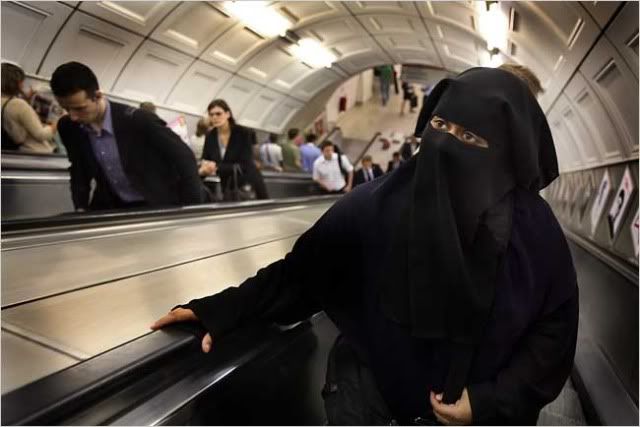
French police began to enforce a ban on face-covering veils, such as the Niqab chosen by some Muslims as an expression of their faith. They say that a symbol of female oppression and the associated implication that the wearer is not worthy to be seen alongside others is not appropriate for a country founded on equality and liberty.
I feel I should pause here to make something clear: I totally disagree with the notion that an omnipresent, benevolent deity would take issue with women - or men, for that matter, who are forbidden from shaving under certain Sikh doctrine - having their faces visible to society at large. I struggle with the idea that a supreme overlord concerned with the welfare of his followers would punish non-adherents with fire and brimstone. I recognise also that the niqab is a personal choice among Muslims; some consider it required, others don't. Despite not reading the Koran myself, I am told by Muslim friends that the practice of face-covering is not mentioned anywhere. But what I believe, and what they believe, is not at the centre of my objection to French policy.
I am also entirely against orthodox believers forcing the people they consider to be "their" women to wear something that they do not wish to. My attitude would come down to this: that woman is not your property and you do not get to hide your oppression of her behind a shield of injured complaint that your beliefs are deserving of protection. Your beliefs are important but recognition of their sanctity stops at the point at which they are impacting on the happiness of others. I am in favour of any policy that attempts to end the oppression of a section of society. But I do not think this law fits that description.
This is because the French ban on a veil is not specific. It simply bans veils in public altogether. So if you are a Muslim woman and you choose to wear the niqab, how can a Government based on liberty and equality tell you that it is not permitted? It is a strange definition indeed of being "liberated" when you are having a right taken away from you. If you're not a Muslim woman but rather you would like to wear a veil because you woke up with a massive spot, is that okay? How about if you're allergic to sunlight? What about then? There are "exemptions" to the ban on face-coverings, but all they seem to do is reinforce the idea that this is a specific attack on the niqab.
I'm exaggerating of course; most women would cover a big spot with makeup and a sunlight allergy is a very rare condition indeed. But the point remains: the French policy is not freeing women who wish to wear vest tops and footless tights but are zipped into their burkas by their oppressive fathers and husbands. Such women are no doubt subject to that treatment and worse in their homes where the niqab ban does not apply. All it does is simply remove the right of French residents to wear what they choose. It's counter-productive, because an already sensitive section of society will feel further victimised and belittled. It will not reduce racial or religious tensions but rather foster them.
So here's what it comes down to. The ideals upon which the French Republic is founded cannot be reconciled with a ban on a piece of clothing. I do not agree with the reasons for which Muslim women choose to wear the niqab, but I feel their right to hold those beliefs should be protected by law rather than attacked by it.
